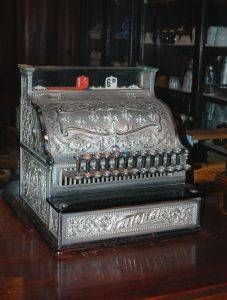History
James Ritty invented the first cash register in 1879 to stop employees from stealing. The patent was issued for the Ritty model cash register in 1883. Ritty, overwhelmed with his two businesses, sold the cash register to Jacob H. Eckert in 1884. Eckert, in turn, sold the company to John H. Patterson in 1884. Patterson renamed the company The National Cash Register Company. He added a paper roll to record sales, thus creating the receipt.
In 1906, the first motorized cash registers were created by Charles F. Kettering, an employee of The National Cash Register Company.
Function
Cash registers are used to record sales and transactions. They are found in almost all retail stores, restaurants, hotels and shops. Cash registers were first invented to prevent employee theft and embezzlement and still serve that purpose today. However, modern cash registers include many more functions. They are able to monitor inventory, comprise detailed sales reports based on user-defined data and print detailed receipts for customers.
Cash registers consist of a mechanical or electronic calculating device connected to a drawer where the money is kept. Modern cash registers may also include bar code scanners, credit and debit card terminals, scales and check-stands. Many cash registers today are actually computers equipped with POS (Point of Sale) software.

Types
There are three main types of cash registers: the standard register, PC-based POS systems and self check-out counters. Standard cash registers are commonly found in retail stores and restaurants. They have minimal functions such as tracking sales of various departments and printing receipts. PC-based POS cash registers allow the cashier to scan an item's bar code, which retrieves pricing and other sales information. The customer is also able to pay for the goods with a credit card, debit card or check. Self check-out counters allow customers to scan the bar code of items themselves without a cashier. The customer then pays for the items via credit card--or in some cases, cash--directly through the terminal.
Benefits
Cash registers have many benefits in the retail world, or anywhere that sales are made. They keep track of sales and quickly process sales transactions. They also keep accurate records, which benefits both the business owner and the customer. POS cash registers have even more benefits than standard cash registers. They produce more detailed reports, track inventory and grow with the business without much hassle.
James Ritty invented the first cash register in 1879 to stop employees from stealing. The patent was issued for the Ritty model cash register in 1883. Ritty, overwhelmed with his two businesses, sold the cash register to Jacob H. Eckert in 1884. Eckert, in turn, sold the company to John H. Patterson in 1884. Patterson renamed the company The National Cash Register Company. He added a paper roll to record sales, thus creating the receipt.
In 1906, the first motorized cash registers were created by Charles F. Kettering, an employee of The National Cash Register Company.
Function
Cash registers are used to record sales and transactions. They are found in almost all retail stores, restaurants, hotels and shops. Cash registers were first invented to prevent employee theft and embezzlement and still serve that purpose today. However, modern cash registers include many more functions. They are able to monitor inventory, comprise detailed sales reports based on user-defined data and print detailed receipts for customers.
Cash registers consist of a mechanical or electronic calculating device connected to a drawer where the money is kept. Modern cash registers may also include bar code scanners, credit and debit card terminals, scales and check-stands. Many cash registers today are actually computers equipped with POS (Point of Sale) software.

There are three main types of cash registers: the standard register, PC-based POS systems and self check-out counters. Standard cash registers are commonly found in retail stores and restaurants. They have minimal functions such as tracking sales of various departments and printing receipts. PC-based POS cash registers allow the cashier to scan an item's bar code, which retrieves pricing and other sales information. The customer is also able to pay for the goods with a credit card, debit card or check. Self check-out counters allow customers to scan the bar code of items themselves without a cashier. The customer then pays for the items via credit card--or in some cases, cash--directly through the terminal.
Benefits
Cash registers have many benefits in the retail world, or anywhere that sales are made. They keep track of sales and quickly process sales transactions. They also keep accurate records, which benefits both the business owner and the customer. POS cash registers have even more benefits than standard cash registers. They produce more detailed reports, track inventory and grow with the business without much hassle.
About Cash Registers
4/
5
Oleh
samy






